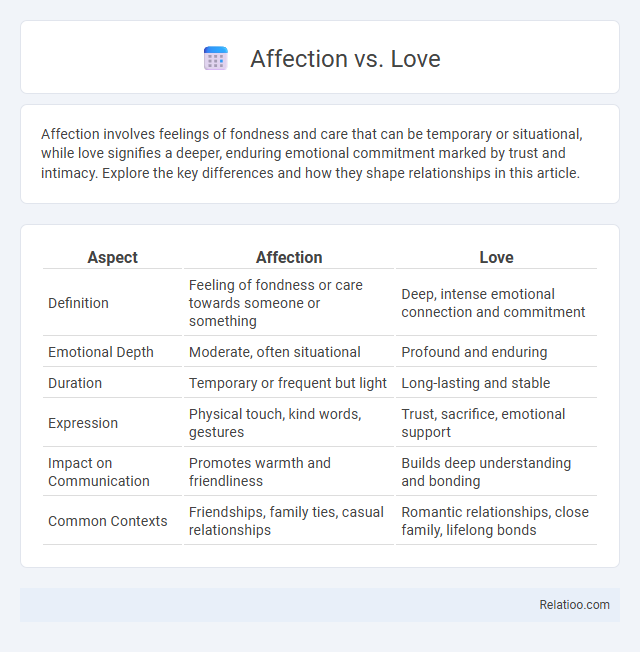Affection involves feelings of fondness and care that can be temporary or situational, while love signifies a deeper, enduring emotional commitment marked by trust and intimacy. Explore the key differences and how they shape relationships in this article.
Table of Comparison
| Aspect | Affection | Love |
|---|---|---|
| Definition | Feeling of fondness or care towards someone or something | Deep, intense emotional connection and commitment |
| Emotional Depth | Moderate, often situational | Profound and enduring |
| Duration | Temporary or frequent but light | Long-lasting and stable |
| Expression | Physical touch, kind words, gestures | Trust, sacrifice, emotional support |
| Impact on Communication | Promotes warmth and friendliness | Builds deep understanding and bonding |
| Common Contexts | Friendships, family ties, casual relationships | Romantic relationships, close family, lifelong bonds |
Understanding Affection: Definition and Characteristics
Understanding affection involves recognizing it as a gentle feeling of fondness or care that often manifests through physical touch, kind words, or supportive actions. Affection differs from love by being more immediate and less intense, serving as an expression of closeness without the deeper emotional or commitment layers associated with love. Key characteristics of affection include warmth, comfort, and reassurance, which foster bonding and emotional connection in relationships.
What Is Love? Exploring Its Depth and Complexity
Love is a profound emotional state characterized by deep attachment, care, and commitment, distinct from affection, which is a general feeling of fondness or warmth, and infatuation, often marked by intense but short-lived passion. It encompasses a complex interplay of psychological, biological, and social factors, driving long-term bonding and mutual growth between individuals. Understanding love involves recognizing its multifaceted nature, including emotional intimacy, trust, and sacrifice, which surpasses mere physical attraction or fleeting emotions.
Key Differences Between Affection and Love
Affection is a gentle feeling of fondness or liking often expressed through physical touch or kind gestures, while love encompasses a deeper emotional bond involving commitment, trust, and long-term connection. Affection can be transient and surface-level, whereas love typically involves a sustained, profound emotional investment that grows over time. Understanding the distinction between affection and love helps clarify relationship dynamics and emotional intentions.
Emotional Impact: Affection vs Love
Affection creates a warm emotional connection that fosters comfort and trust, while love generates deeper emotional bonds characterized by commitment and passion. Your emotional well-being is significantly shaped by the intensity and quality of these feelings, impacting relationships on different levels. Distinguishing between affection and love helps you navigate your emotions and nurture meaningful connections effectively.
Signs You’re Experiencing Affection
You're experiencing affection when you feel a warm, comforting connection that includes gentle touches, frequent smiles, and consistent acts of kindness. Signs of affection often involve physical closeness, such as hugging or holding hands, and emotional support without the intensity or exclusivity typical of love. Recognizing these subtle expressions can help you understand the depth of your relationships beyond mere attraction or romantic passion.
Signs of Genuine Love in Relationships
Genuine love in relationships manifests through consistent actions, emotional support, and deep understanding beyond mere affection or infatuation. Signs of authentic love include unwavering trust, respect for your individuality, and a willingness to grow together through challenges. Recognizing these markers helps you distinguish lasting love from fleeting emotions or superficial affection.
Affection and Love: The Role They Play in Healthy Relationships
Affection and love serve distinct yet complementary roles in healthy relationships, with affection manifesting as tangible expressions of warmth, such as hugging and kind words, fostering emotional connection and security. Love encompasses deeper commitment and emotional intimacy, providing a foundation for trust, support, and long-term partnership. Prioritizing both affection and love enhances relationship satisfaction by balancing physical closeness with emotional depth.
Can Affection Grow Into Love?
Affection represents a gentle feeling of fondness or care, often based on familiarity and comfort, while love is a deeper, more complex emotion involving commitment, passion, and intimacy. Your initial affection for someone can evolve and deepen through shared experiences, trust-building, and emotional connection, ultimately transforming into lasting love. Understanding this progression helps recognize that affection is a foundational step toward developing meaningful, long-term romantic relationships.
Navigating Relationships: When to Recognize the Difference
Recognizing the difference between affection and love is crucial for navigating relationships effectively, as affection often represents warmth and care without the deeper commitment love entails. Affection involves physical touch, kindness, and attention, which can be present in friendships or early romantic stages, while love encompasses emotional depth, trust, and long-term dedication. Understanding these distinctions allows individuals to set appropriate boundaries and expectations, fostering healthier and more honest connections.
Building Stronger Bonds: Balancing Affection and Love
Balancing affection and love is essential for building stronger bonds, as affection provides the tangible expressions of care, while love encompasses deeper emotional commitment and trust. Consistent affectionate actions like hugs, kind words, and thoughtful gestures reinforce feelings of love, creating a secure and nurturing relationship environment. Integrating both affection and love strengthens emotional intimacy, fostering resilience and mutual understanding in partnerships.

Infographic: Affection vs Love
 relatioo.com
relatioo.com